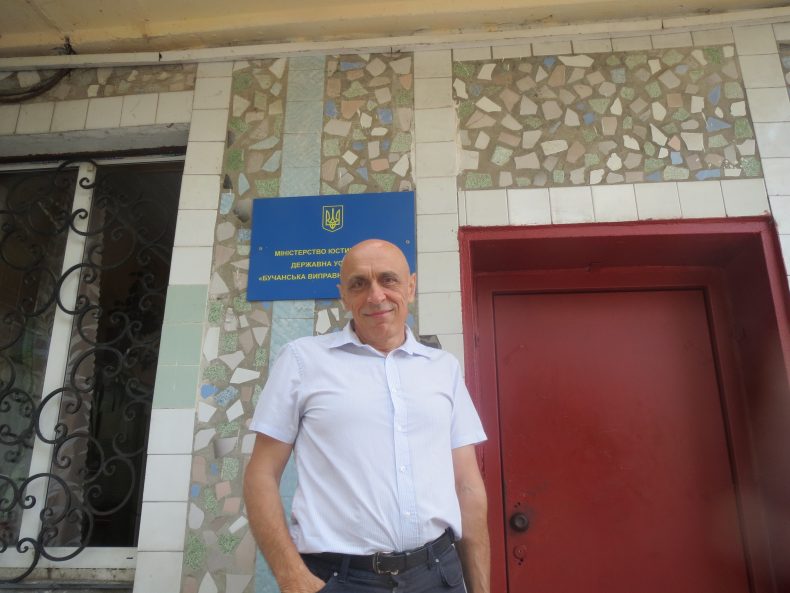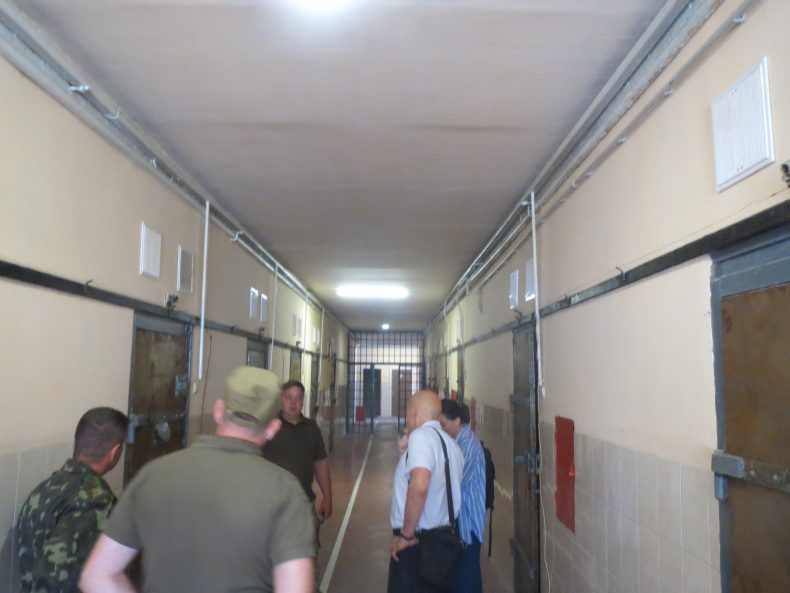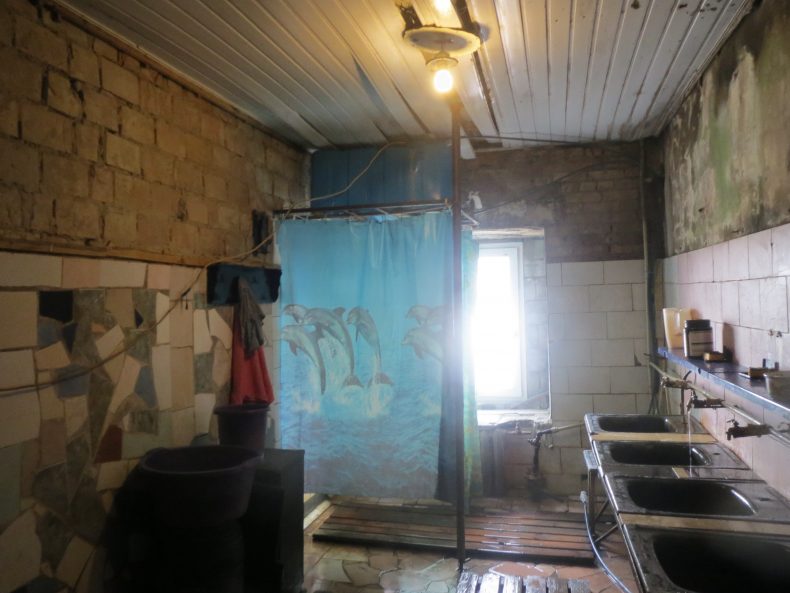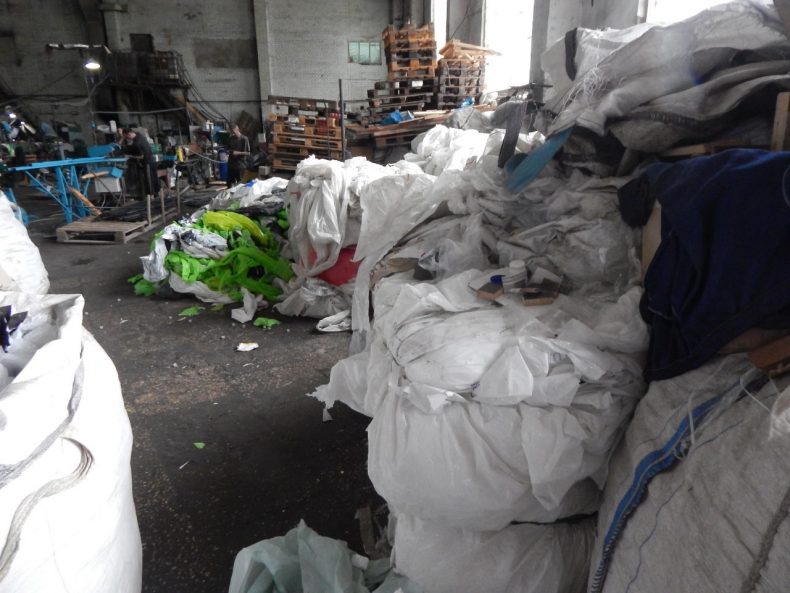Ukrainian Helsinki Human Rights Union continues implementation of the monitoring visits program to Ukrainian penitentiary establishments, one of the main tasks of which is checking the prison conditions for PL HIV. On August 25, 2019 UHHRU monitors visited Bucha Penitentiary Establishment No. 85” (BPE – 85) and detected a lot of drawbacks in the work of the penitentiary establishment.
During the monitoring visit UHHRU Executive Director, Oleksandr Pavlichenko, was accompanied by coordinator of the network of UHHRU public reception offices Natalia Kozarenko and UHHRU expert Volodymyr Gluschenko.
UHHRU Executive Director Oleksandr Pavlichenko: “The situation with prison conditions and medical services for the convicts in the penitentiary establishment No. 85 is just appalling and shall be immediately rectified”.
State institution “Bucha Penitentiary Establishment No. 85” (BPE-85) is the institution with the average security level for imprisonment of men convicted for imprisonment for certain period, which served the sentence in the penitentiary establishments before.

At Bucha penitentiary establishment there is a multi-field hospital for 120 beds, for the day of the visit there were 99 ill convicts in the hospital.
Prison hospital got licenses for medical practice, in particular, for carrying out surgeries and for storing strong pain-killers and drug-containing substances, which can be used during surgeries.
The level of staffing with qualified healthcare specialists impacts quality and timeliness on the medical services provision by the healthcare institution. Thus, the staff schedule of the hospital includes 58 positions of the healthcare specialists. 14 positions are vacant in the hospital, out of them – chief doctor, head of the ambulatory-diagnostic department and 7 doctors’ positions. There is a critical need in infectious disease specialist and TB specialist. In the hospital, where surgeries should be carried out, there are no anesthesiologist and nurse anesthetist, the ultra-sound diagnostic is not carried out. That is why planned surgeries, requiring anesthesia, are not carried out for a long period already. In the discussion, a number of convicts, which were transferred from other penitentiary establishments with the aim of undergoing surgery, complained about absence of planned surgeries. The convicts are transferred to Bucha hospital also for urgent surgeries. Such situation shall be immediately rectified.

Critical situation was also detected with convict U., who had compound fracture of a leg and now there is a danger of complication (see photo), and he agrees for ablation, but the surgery cannot be carried out because there is no anesthesiologist.

Meetings of the Medical Supervisory Committee (MSC), which approves medical conclusions, allowing the convicts to apply to court for medical excuse (article 84 of CCU), are not conducted because of the absence of doctors. In the hospital the monitors talked to the convict M., whose case is handled by UHHRU lawyer, and who for a year already cannot get examined by this MSC. The convict is disabled after cerebrovascular accident, and cannot do basic things for himself.
There are 13 convicts with HIV/AIDS under the follow up in the penitentiary establishment. Though this figure may not depict the real situation. Last year, during the monitors’ visit it was detected that the penitentiary establishment did not have the facilities for testing CD4 cells and viral load of those ill with HIV/AIDS, such testing is voluntary and certain part of the convicts from risk category just do not undergo testing.
Conditions of stay in the hospital
The coordinator of the UHHRU public reception offices network Natalia Kozarenko: “The situation with the hospital conditions is poor. First of all, the wards shall be renovated. There is dampness and fungi in the wards. The safety rules are violated – open switch sockets”.
Patients’ schedule is practically not observed and the control over the convicts staying in the hospital is very weak. All hospital wards are actually prison wards with metal doors opened by inspector. There is only one inspector for three floors and for all wards, accordingly, only one ward can be opened at a time. Under such conditions it is practically impossible to provide for even one hour walk for each convict, which was proved by the convicts themselves. The wards are full of tobacco smoke, as there is no opportunity to smoke, other than in the ward.
Also, there is lack of hygiene in the wards – food left-overs, which are deteriorating, on the floor in the wards – bags with pastries donated by the charitable organizations.
Convicts, which were in the hospital, remarked that for two weeks already they could not take a shower. As the hospital staff explained – water heaters burned. The head nurse informed than new boilers were procured and hot water would be provided, thus the situation would be rectified the same day.
Bedclothes used by the convicts also were not changed for two weeks.
When visiting the convicts in the wards it was proved that indeed there was a problem with medicines provision, carrying out necessary diagnostics, which cannot be carried out in the conditions of the penitentiary establishment.
In the ward No. 12 there are 10 beds, but there are 11 patients in the ward.

Living conditions
In the accommodation block there are 150 persons. 46 of them live in one big room of the size of big hall. At that there are even double-bunk beds, where the convicts sleep. Common facilities – shower, toilet, corridor need urgent renovation. In sanitary facilities there is dampness and mold. Evidently, the control on behalf of the administration over the living conditions and premises’ condition is weak.
At the same time in the department there are also three renovated rooms, where there are 4-6 convicts. The convicts are kept in unequal living conditions – some live in renovated wards with small number of people, and some in the wards requiring major renovation.
Status of implementation of the pilot project “Serving Life”
In the partnership with All-Ukrainian Charity Foundation “Coalition of HIV-Service NGOs”, in the framework of the pilot project “Serving Life: quality integrated services for HIV, TB and viral hepatitis C for people in trouble with the law” (“Serving Life”), with the financial support of US Agency for International Development (USAID), it is planned to launch in the penitentiary establishment a pilot project of methadone maintenance treatment (MMT). The drug-store, the room for medicines distribution are fully equipped, all required permissions are obtained. The pilot project protocol was approved by the Order No. 4092/5 of Ministry of Justice of Ukraine dated December 26, 2018, regarding implementation of the maintenance treatment in the state institution “Bucha Penitentiary Establishment (No. 85)”.
Pilot project is planned for 6-8 persons. The participants are not selected yet, as there is a problem – the convicts, as a rule, do not use opioids, but some much cheaper substances, and thus cannot be transferred to MMT.
According to the healthcare staff, there are up to 80-85% of the drug addicts in the penitentiary establishment, and according to the penitentiary establishment staff – 35%. In any case, even based on the lowest numbers, it means that there are at least 200 such persons in the penitentiary establishment.
In the discussion with the healthcare staff, they referred to Moldova’s experience, which envisaged separate keeping of persons receiving MMT. They also stressed that the penitentiary establishment needed the station for syringes exchange. The problem with condoms was also mentioned.


Recommendations of the UHHRU Monitors
Having visited hospital wards, prison wards, manufacturing area and after communication with the convicts, staying in the multi-field hospital for treatment, the monitors mentioned the following systemic violations, which shall be rectified.
- There is a real problem with the convicts having serious diseased and are released or can be released from serving the sentence for medical reasons, and which do not have an opportunity to get treatment. Because of the lack of the healthcare staff, the convicts do not receive proper treatment, no surgeries are carried out in the hospital, the meetings of MSC are not conducted.
- In the hospital all hospital wards are actually prison wards, which are constantly closed, and the convicts remain closed in these wards practically all the time. At that, it often happens that the convicts, who do not smoke, are force to inhale tobacco smoke, when people staying in the same room with them smoke. Walks envisaged for the convicts are not regular, because for three floors of the hospital there are only one duty officer, who can open only one ward at a time, and let out the convicts from it.
- Disabled convicts (one of such convicts stay in the hospital for about a year already) are completely deprived of the opportunity to get outdoors. Other convicts are forced to take care of such convicts, instead of special staff, which is also a violation of the rules of providing care for such ill convicts.
- In the hospital there is a lack of subject matter specialists, such as anesthesiologist, infectious disease specialist and TB specialist, which shall provide required medical services in the hospital, instead the ill convicts wait for weeks and months, at that their health condition deteriorates.
- In case of absence of the subject matter specialist the penitentiary establishment cannot provide the transport and necessary convoying of all convicts in order for them to be examined in the civilian hospitals.
- Relevant policy shall be implemented for work involvement on the voluntary basis, by increasing the number of orders for the manufacturing facilities of the penitentiary establishment, and types of work shall be diversified and facilitate the qualification upgrade of the convicts.
Photos by Natalia Kozarenko
Ukrainian Helsinki Human Rights Unions implements the project “Development of the legal network for protection of the people living with HIV/AIDS, representatives of key PLHIV communities and persons ill with TB” with the financial support of the Charitable organization “All-Ukrainian Network of the People Living with HIV/AIDS” in the framework of implementation of the project “Releasing the Burden of TB and HIV infection through creation of the open access to timely and quality diagnostics and treatment of the TB and its resistant forms, expanding evidence based prevention, diagnostic and treatment of HIV infection, and creation of stable and sustainable health protection systems”, which is implemented with the financial support of the Global Fund to Fight AIDS, TB and Malaria.









